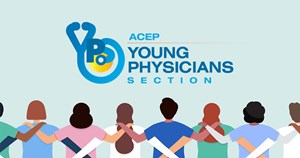Fellowship Spotlight: National Health Policy Fellow with Dr. Christopher Clifford
In this new video series, ACEP's Young Physicians Section explores the diverse world of emergency medicine fellowships. This episode features Christopher Clifford, MD, a National Health Policy and Advocacy Fellow. Watch the video for a quick overview of her role and keep reading for more details about her fellowship experience.
YPS: Tell us a little bit about the fellowship and walk us through your day-to-day. What does that look like for you?
Dr. Clifford: Mine is a little bit different than other fellowships. It's called a Health Policy and Advocacy fellowship, and it's run through the George Washington University in Washington, DC. It was initially conceived under Dr. Aisha Terry and Dr. Denise Blanchard, who are two really powerhouse people in health policy and have been a a big part of that community for a very long time. And as, as probably most people know Dr. Terry is incoming president of ACEP so you know you’re getting quality when you come into the Fellowship and you’ve got great mentors there. The Fellowship is two years long and is non-ACGME accredited. The clinical hours are pretty easy, averaging seven to eight shifts a month over a two-year span. During that time you’ll get a bunch of different didactics that I’ll explain later.
YPS: What's unique about your fellowship?
Dr. Clifford: When I was deciding on fellowships, I was really looking towards more of a health policy focus. I think a lot of what we do in the emergency room is downstream work. We’re the safety net—we see stuff after years and years of neglect or abuse or having not gotten good care in the social system. And then we see it on the tail end in the emergency room. I always knew that I wanted to go into health policy to mediate that and work a little more upstream. Now health policy fellowships are hard to come by, I will be frank. There are couple state-based health policy fellowships and the ones I know of are in California, Maryland and maybe one in Wisconsin. But those are state health policy-based fellowships. If you’re looking to be a big player on the state level, those could be good options. In terms of doing work on the federal level, it’s important to be closer to the nation’s capital or working in some capacity in a think tank or something like that that works on national issues. The ones I’ve found that have been really fantastic and the ones I was considering were George Washington [University] and Georgetown [University].
YPS: Why were you interested in this particular fellowship?
Dr. Clifford: The reason I picked George Washington is because of the quality of the program and the level of mentors you get with it. They have a really good reputation and I know of a couple of people who have done it the past and have spoken very highly of it.
YPS: What has surprised you about it?
Dr. Clifford: I think for a little bit of context, there’s an unspoken rule for ACEME fellowships versus non-ACGME fellowships that the non-ACGME fellowships are easier. I would definitely not rely on that type of thinking. When you’re talking about a health policy fellowship, there’s a good amount of work. It’s not overwhelming – it’s manageable – but it’s not sitting back and doing a couple shifts and then learning about health policy. You’re busting out a good amount of hours while trying to balance other things. So if you’re looking for an easier time, I would suggest something else.
YPS: What's your favorite part about it, and what's your least favorite part?
Dr. Clifford: The one thing that comes to my mind immediately is really the placement. Being in the nation’s capital, you’re working with the biggest think tanks. You can get your pick of the litter. You can work for Congress, a Senator, a Senate health committee – those are some of what a lot of fellows have done in the past. You can also work for HHS, or even the White House, potentially. You’re really on a different level, a different playing field. But it’s really a double-edged sword a little bit because there can be too many options. It can be difficult to pick a placement for your second year. I’m going through that process now as I’m going to transition from first year to the second year later this summer. And I was very specific about working at HHS until I saw some other opportunities out there, so it’s been a harder decision. I will say that the people who run the fellowship are very good and very supportive. They have done this in the past, so they know what you’re going through and really try to help you figure things out like your immediate priorities and where you want to be in five years.
A lot of people who have done a health policy fellowship already have strong ties to health policy. And you start to think “do I need the fellowship to get where I want or do what I want later in life?” I think people approach this fellowship with the mentality that it’s strong in building connections and that never goes out of style. That’s the best thing you can do in your younger years. There’s a big emphasis on building your rolodex so you have people to call on in the future.
The biggest thing I’ve enjoyed as far as learning opportunity, is the well roundedness of it. We do journal clubs once or twice a month but they’re really intensive. We get top experts in their field. Our last journal club was about the Veteran’s Administration, and we had two top-level officials for the VA that were talking about their field, their real world experiences, things like that. You get that connection but a really good education too. Much more than I got in medical school.
It was eye-opening just to see the breadth and depth of different topics in the health policy world. You’re able to get a real well-rounded feel and actually go to the health policy school to take some classes for free as well. I’m getting a masters in health policy and you feel like you’re leaving with the full knowledge that you can.
YPS: Do you have any advice for others who may be interested in a research fellowship?
Dr. Clifford: It’s definitely a hard decision as to whether or not to do a fellowship and that comes to mind as many come to the end of their residency. The main thing I thought about was “how much of an impact am I trying to make?” And emergency medicine makes a big impact in the community. You have the ability to advocate for your community, but that’s not necessarily part of the training you receive in residency or medical school. You either stumble upon it or seek it out to be a really strong advocate. And that’s what drew me to the health policy fellowship because I knew I wanted to have a bigger impact, and this was my best option.
In terms of actual advice? To make yourself more competitive for a health policy fellowship, get involved in organized medicine – it’s a great avenue and it never goes out of style. The American Medical Association, the American College of Emergency Physicians and other organizations around the US are always looking for different people to get involved and do projects like that. It’s a good way to diversify your portfolio. It’s a good idea to do something that’s research-based, but also make sure it’s aimed at something you’re trying to change. So the best advice I always give to people like my mentees is do your research that has the ability to drive the evidence that makes change. Throwing another paper out there because you know or you can and because it’s easy or looks good on an application doesn’t necessarily come across. The last piece of advice is to find good mentors. I’ve been very lucky in the mentors that I have and that I’ve stumbled upon in the past. Many think it’s just health policy, it’s just the government and how it interacts with medicine. But there are different levers out there and different positions you can have. I’m still learning things today and I’ll probably be learning stuff five years from now. Having a mentor or different mentors that have had different experiences is among the best things, at an earlier level.



